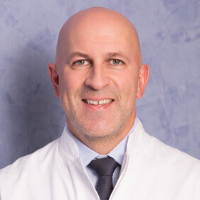
The program includes:
- Initial presentation in the clinic
- clinical history taking
- review of medical records
- physical examination
- laboratory tests:
- complete blood count
- biochemical blood analysis
- blood coagulation analysis (aPTT, PT, INR)
- inflammation indicators (CRP, ESR)
- metabolic analysis of blood
- cardiovascular disease risk markers
- kidney function test (creatinine, urea)
- color doppler echocardiography
- color doppler sonography of cerebral and peripheral vessels
- abdominal aorta duplex
- CT angiography (on indication 1200 €)
- nursing services
- consultation of related specialists
- consultation of the chief physician and all leading experts
- development of individual treatment plan
- written statement
Required documents
- Medical records
- Ultrasound scan, MR/CT-angiography (if available)
Service
You may also book:
 BookingHealth Price from:
BookingHealth Price from:
About the department
The Department of Vascular Surgery at the Brothers of Mercy Hospital Munich provides the full range of modern diagnostic tests and surgical treatment of pathologies of blood vessels.The department's team of surgeons focuses on patients with carotid stenosis, abdominal aortic aneurysms, occlusive peripheral arterial disease and varicose veins. In most cases, the specialists of the medical facility manage to perform treatment with endovascular techniques. Hybrid surgical techniques can be used in complex cases. The department's surgical options are supplemented by procedures for the formation and repair of dialysis shunts, and reconstructive interventions on the blood vessels, for example, in chronic wounds or diabetic foot syndrome. Clinical practice is based on using the latest treatment methods and the high professionalism of surgeons, which in combination provides patients with the best treatment outcome. This is important for doctors to provide the patient with personalized medical care, considering their needs and wishes. The Head Physician of the department is Dr. med. Agamemnon Sotiriou.
One of the most demanded operations in the department is surgery for carotid artery stenosis, which can lead to severe complications (in particular, stroke) without timely treatment. The department's specialists offer the following operations: open thromboendarterectomy with patch angioplasty and eversion thromboendarterectomy. The essence of thromboendarterectomy is the direct removal of atherosclerotic plaques from the inner surface of the carotid artery. The final stage of the intervention is the application of a patch to the operated site of the carotid artery. When performing surgery, neuromonitoring systems and modern binocular loupes are used. An intraoperative ultrasound examination serves to assess the treatment outcomes.
An equally common pathology in the clinical practice of the medical facility is an occlusive peripheral arterial disease, characterized by stenosis or total cessation of blood flow through the arteries of the lower limbs. The pathological condition leads to multiple complications. In severe cases, limb amputation becomes the only treatment. During the diagnostic examination, the doctor must determine the grade of blood vessel stenosis/occlusion. For this purpose, the department's specialists perform angiography or magnetic resonance angiography. Therapeutic options in this area include both sparing endovascular interventions and open surgery. The most commonly performed are stent implantation and balloon dilatation. With appropriate clinical indications, the department's surgeons resort to endarterectomy with subsequent plastic reconstruction, bypass surgery and prosthetic repair. In some cases, the specialists use hybrid surgical techniques, combining endovascular and open interventions.
The department's surgical team is deservedly proud of its successful results in treating abdominal aortic aneurysms. The pathology is an abnormal enlargement of the largest blood vessel in the human body, which is accompanied by a thinning of its wall. The insidiousness of an aneurysm is that it does not cause any symptoms and is often diagnosed incidentally during the diagnostic examination for other complaints. If a patient does not receive timely treatment, the risk of aneurysm rupture and the development of severe internal bleeding, which is often fatal, increases. The surgical treatment of abdominal aortic aneurysm is based on the removal of the affected area of the vessel with its follow-up prosthetic repair. Depending on the particular clinical case, both open and endovascular techniques can be used. Open surgery requires general anesthesia. The prosthesis is implanted under angiographic guidance.
The doctors of the medical facility provide effective treatment of varicose veins. A clinical examination and duplex ultrasound are required to determine the stage of the pathological process. When planning a regimen of therapeutic measures, doctors always consider an aesthetic aspect. As a rule, the specialists prefer sparing treatment methods: sclerotherapy, mini-phlebectomy, endovenous laser coagulation, etc. Open surgery is usually performed for severe varicose veins, accompanied by trophic ulcers.
The department's range of surgical services includes:
- Diagnostics and treatment of carotid artery stenosis
- Open thromboendarterectomy with patch angioplasty
- Eversion thromboendarterectomy
- Diagnostics and treatment of occlusive peripheral arterial disease
- Stent implantation
- Balloon dilatation
- Endarterectomy followed by plastic repair
- Bypass surgery
- Prosthetic repair
- Hybrid interventions combining open and endovascular techniques
- Diagnostics and treatment of abdominal aortic aneurysms
- Open surgical interventions for the implantation of vascular prostheses
- Endovascular prosthetic repair using catheter techniques
- Diagnostics and treatment of popliteal artery aneurysms
- Surgical removal of the aneurysm with bypass or endoprosthesis implantation
- Diagnostics and treatment of advanced kidney failure
- Arteriovenous fistula (dialysis access) formation or correction
- Dialysis shunt formation
- Catheter implantation into the atrium (for hemodialysis)
- Diagnostics and treatment of varicose veins
- Sclerotherapy
- Mini-phlebectomy
- Endovenous laser coagulation
- Classic open surgery
- Other vascular diseases and surgical treatment methods
Curriculum vitae
Higher Education and Professional Career
- 2023 Appointed as a Member of the Examination Committee for the specialty "Vascular Surgery" of the Bavarian Medical Association (2023-2028).
- 2021 Board certification in Endovascular Surgery, German Society for Vascular Surgery.
- Since 2020 Head Physician, Department of Vascular Surgery, Dritter Orden Clinic.
- 2018 Head of the Regional Shunting Center, Dritter Orden Clinic.
- 2012 Senior Physician, Department of Vascular Surgery, Munich West Hospital and Dachau Hospital.
- 2008 Additional qualification in Transfusion Medicine.
- 2007 Specialization in Vascular Surgery.
- 2006 Senior Physician and Head of the Intensive Care Unit at the Department of Vascular Surgery, Munich Pasing Hospital.
- 2005 Additional qualification in Emergency Medical Care.
- 2004 Additional qualification in Sports Medicine.
- 2003 Board certification in Surgery.
- 2001 Theoretical foundations of radiation protection standards.
- 2000 Thesis defense, Technical University of Munich. Subject: "Postoperative recovery after liver transplantation in patients with liver cirrhosis".
- 1998 - 2005 Assistant Physician, Department of Surgery, Munich Pasing Hospital.
- 1997 - 1998 Internship, Department of Surgery, Munich Pasing Hospital.
- 1993 - 1997 Medical studies, Technical University of Munich.
- 1991 - 1993 Medical studies, Ludwig Maximilian University of Munich.
Photo of the doctor: (c) Barmherzige Brüder Krankenhaus München
About hospital
According to the Focus magazine, the Brothers of Mercy Hospital Munich ranks among the top German hospitals in the Federal State of Bavaria!
The hospital is a modern medical facility with the highest level of medical care and long traditions. The hospital operates on the basis of the Technical University of Munich and the German Academy of Nutrition, which contributes to the introduction of progressive diagnostic techniques and therapeutic innovations into clinical practice. The history of the medical facility has more than 100 years, and throughout this time, the specialists of the hospital manage not only to keep abreast of the very latest advances in medicine, but also remain true to the principles of charity and human compassion.
With more than 1,100 employees, the department's competent medical team admits about 18,300 inpatients and more than 31,500 outpatients every year. The hospital employs about 200 specialized physicians who work for the benefit of their patients and provide them with the best quality of treatment, but, at the same time, pay due attention to the patient's emotional state, try to support him in every possible way, and tune him to a positive treatment outcome.
The hospital's main focuses include general and abdominal surgery, gastroenterology, hepatology, oncology, urology, cardiology and pulmonology, orthopedics and traumatology, palliative care, diagnostic and interventional radiology, and others. The hospital regularly demonstrates high treatment success rates in all areas of its specialization, thanks to which it has gained an excellent reputation not only in Germany, but also in the European medical arena.
Many hospital's departments are awarded with prestigious quality certificates, including the endoCert certificate in joint replacement surgery from the German Society for Orthopedics and Orthopedic Surgery (DGOOC), the certificate of the German Hernia Society (DHG), the certificate of the German Cardiac Society (DGK), the certificates of the German Cancer Society (DKG) in bowel and liver cancer treatment. Patients can be sure that they trust their health to the best professionals who successfully cope with clinical tasks of any complexity.
Photo: (с) depositphotos
Accommodation in hospital
Patients rooms
The patients of the Brothers of Mercy Hospital Munich live in comfortable, spacious single and double rooms with bright colors. The standard room furnishing includes an automatically adjustable bed, a bedside table, a wardrobe, a telephone, a TV and a radio. Single rooms also have a mini-fridge and a safe. There is also a table and chairs for receiving visitors. The hospital offers access to Wi-Fi. Each patient room has an ensuite bathroom with a shower and a toilet. The bathroom has a cosmetic mirror, a hair dryer and toiletries, towels, etc.
Meals and Menus
The patients of the hospital are offered healthy and tasty three meals a day: breakfast, lunch and dinner. The menu also features vegetarian dishes. If you do not eat all the food for any reason, you will be provided with an individual menu.
Further details
Standard rooms include:
Religion
There is a small chapel on the territory of the hospital, where worship is regularly held. The chapel is also open for independent visits and prayers.
Accompanying person
Your accompanying person may stay with you in your patient room or at the hotel of your choice during the inpatient program.
Hotel
You may stay at the hotel of your choice during the outpatient program. Our managers will support you for selecting the best option.





